Interview: Sally Delehant & Emily Pettit
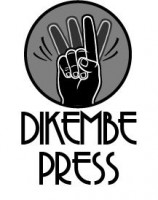 Named after former professional basketball player and humanitarian extraordinaire Dikembe Mutombo, Dikembe Press is a newish micro-press out of Portland, Oregon and Lincoln, Nebraska that publishes things, most recently Matthew Rohrer’s poetry chapbook A Ship Loaded With Sequins Has Gone Down and Emily Pettit’s poetry chapbook Because You Can Have This Idea About Being Afraid Of Something. In celebration of the latter title, the poet Sally Delehant—author of the collection A Real Time of It (The Cultural Society, 2012)—recently conducted an interview with Emily P. to discuss Because You Can Have This Idea About Being Afraid Of Something and Emily’s notions regarding anxiety, the definition of the word “conundrum,” dollhouse furniture and the artwork of Bianca Stone (which is featured throughout Because You Can Have This Idea About Being Afraid Of Something).
Named after former professional basketball player and humanitarian extraordinaire Dikembe Mutombo, Dikembe Press is a newish micro-press out of Portland, Oregon and Lincoln, Nebraska that publishes things, most recently Matthew Rohrer’s poetry chapbook A Ship Loaded With Sequins Has Gone Down and Emily Pettit’s poetry chapbook Because You Can Have This Idea About Being Afraid Of Something. In celebration of the latter title, the poet Sally Delehant—author of the collection A Real Time of It (The Cultural Society, 2012)—recently conducted an interview with Emily P. to discuss Because You Can Have This Idea About Being Afraid Of Something and Emily’s notions regarding anxiety, the definition of the word “conundrum,” dollhouse furniture and the artwork of Bianca Stone (which is featured throughout Because You Can Have This Idea About Being Afraid Of Something).
Word is bond.
***
Sally Delehant: The title of the chapbook begins with the word “because” which positions the reader to assume a “why” question floats in the background of the text. I’m wondering what you think that question might be? Does it have to do with why we curl up to a specific person or part of our world? Or is the title perhaps an answer to the big question hanging above all of us — “Why write a poem?” Someone smarter than I am said in a poetry workshop once that on a basic level a poem works out or goes deeper into some kind of anxiety. Something is either resolved or agitated more. Do you agree? Do these poems work like that?
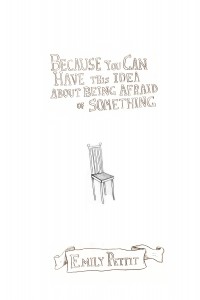 Emily Pettit: I think there are a number of questions that lead to this “because” and two questions in particular. One is — why are we behaving this way? The other is — why are we feeling this way? Two rather general seeming questions, until they are connected to specific ideas and feelings encountered in the poems. The question — why write a poem? — is a question and is a question that I can see these poems pointing people towards thinking about.
Emily Pettit: I think there are a number of questions that lead to this “because” and two questions in particular. One is — why are we behaving this way? The other is — why are we feeling this way? Two rather general seeming questions, until they are connected to specific ideas and feelings encountered in the poems. The question — why write a poem? — is a question and is a question that I can see these poems pointing people towards thinking about.
In response to your mention of poems being ways that one might work through or with anxiety, I think poems are often working in this way, being asked to work in this way. In regards to my poems, I’m hesitant to use the word “anxiety” because I feel like I use that word all the time in conversations I have with other people and myself and that its meaning is not containing what I want it to communicate. Or various things the word “anxiety” communicates, I worry negate or dim the things in poems that I’m looking for as a reader and looking to make happen as a writer. A friend recently shared with me the following Borges line, “The metaphysicians of Talon are not looking for truth, nor even an approximation of it; they are after a kind of amazement.” In poems I am looking for amazement rather than truth or an approximation of truth. For me amazement might be experienced through encountering two words, the juxtaposition of which make music to my ear or a striking image to my eye. I am looking to be amazed by a feeling that arises when I encounter the ideas, images and music that I encounter in poems. Why I write poems is to find these things that I am also looking for as reader. Anxiety is everywhere, but something I love about poems is that a poem is a place where I do not need to name anxiety, should I not want to. Naming things can give things power or an agency of sorts and the effects of naming things can be good or bad depending on too many factors for me to list here. Poems are a place where I feel I have control over what my brain and heart give agency to. And to a certain extent I have control over the effects this agency has. I have not found many places outside of writing where I get to experience this sort of control. In the poems in this chapbook there are ideas about anxiety and ideas about ideas about anxiety, but they are existing alongside often adamant ideas that anxiety can be controlled and sometimes productively ignored and denied. What it is taking me a long time to say is, I like how my imagination deals with anxiety more than the way other parts of me deal with it.
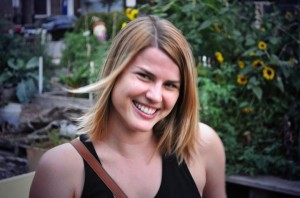
Sally Delehant
SD: In the first poem in Because You Can Have This Idea About Being Afraid Of Something you write, “I freak out, freak out, freak out, / with a quiet mouth,” and as I trace the freak out through the poem (and chapbook) there seems to be tension between doing/being what one naturally does/is and what one could/should do and be if that makes sense. You can wear a nametag that says Emily or rabbit and in another sense be the “best refrigerator ever” as well as many other things. What I’m clumsily getting around to on this sleepy, Sunday afternoon is that I think part of our humanity tells us we should should should be a certain way and we fear we might be “the most ridiculous person (we) know” as you write later. The most beautiful and comforting thing we can hear is that we are good dogs. The speaker “wants to be a good animal.” She wants to let us know that we “are exactly where we are supposed to be.”
Are there things that make you think you aren’t where you are supposed to be? Without being intrusive I want to ask you one thing that scares you, and then I promise we can talk about the beautiful drawings in the book which I am curious about too. What is a thing you are afraid of, Emily?
EP: I’m afraid me talking about fear outside of poems is like encountering a black hole. A hall of mirrors. My brain is exhausting in this way. I’m afraid that outside of my poems I fail to be funny about fear in the way that I want to be. I like that in poems I can feel funny about fear. I think anxiety and fear are absolutely linked. I have never encountered a definition of anxiety that does not use the word fear as a part of that definition. I like that when I’m dealing with fear in my poems, while writing poems, I do not feel anxious. Or if I am feeling something that could be defined as anxiety or fear, I’m not aware of it, or not naming it.
I think the thing that both my poems and my answer to your first question point to is a fear of both the presence and absence of control. It’s a conundrum. And I say conundrum, because I don’t think of a conundrum as hopeless. I like how in language with one word, conundrum, you can communicate a subject and a tone. For example, if you had asked me “What is a thing you are afraid of?” versus “What is a thing you are afraid of, Emily?”, to me the first question feels much less scary than the second question. Naming me has given me a louder agency, more loudly bonding me to whatever answer I answer. One word. A word. A name. For me to explore fear or ideas of fear in a poem is a place that I am not as afraid of exploration. Exploration feels not just possible but exciting. In conversation and in prose (like writing this now) I have trouble with this exploration; I feel accountable to ideas leading to resolutions of sorts, resolutions that very possibly do not exist. Resolutions of logic that are not expected in poems. Or are not expected by me in relationship to what I think of as a poem. I’m afraid of many things. I’m very appreciative of a poem being a place where I can have some control over my fears and how they feel to my brain and my heart and my body. I’m very appreciative for getting to write poems and read the poems of others for the ways in which this engagement allows me to escape my fears.
Erik Satie Watusies His Way Into Sound
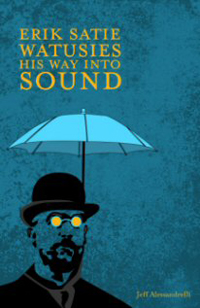 Erik Satie Watusies His Way Into Sound
Erik Satie Watusies His Way Into Sound
by Jeff Alessandrelli
Ravenna Press, 2011
66 pages / $11.95 Buy from Ravenna Press
One of the first things readers of Jeff Alessandrelli’s Erik Satie Watusies His Way Into Sound will notice is the fact that the back cover contains biographical material for both the author and Erik Satie; upon opening the book, the front matter contains acknowledgments from both men as well. The collection’s copy and front matter signal, it would seem, a playful engagement with identity and proper nouns. Specifically, Alessandrelli conflates himself, the speaker of his poems, and Erik Satie in such a manner that all three personalities become intimately entwined. The book’s first iteration of the list poem “A Game of Numbers” twice addresses this melding:
ever year searching for a sleeker, more
impulsive version of ourselves. (5)
…
8. As an adult Eric Satie became Erik Satie
to highlight his Scandinavian lineage.
Or on a whim. (6)
April 6th, 2012 / 12:00 pm
The Flasher
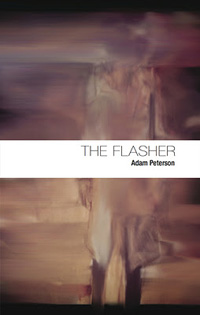 The Flasher
The Flasher
by Adam Peterson
SpringGun Pess, 2012
60 pages / $14 Buy from SpringGun or SPD
I read 80% of Adam Peterson’s The Flasher in the bathtub, which seems entirely fitting. I’m not at all afraid to say that baths stimulate me in the same way flashing stimulates flashers. Baths compel me, they invigorate me, in some strange way they solidify my relationship to the greater world. The only difference between soaking in the tub and flashing is where one is solitary, contemplative, the other asks for a wider public, a larger stage. But both are—mysteriously no doubt—borne out of reverence for one’s place in the always-spryly grinning universe.
At its core The Flasher is a love story. A man—the flasher—falls in love with a woman—a muffin store employee—who “takes [muffin] batter off [her body] with her tongue” (31) and is possessing of what can only be described as a nuanced personality. The flasher attempts to woo said woman/muffin store employee. He fails. The end. Throughout the course of the book other things, of course, happen: the flasher visits his ailing mother in the hospital, the flasher makes french toast, the flasher uses a public restroom, the flasher swallows the Earth and diagnoses the sky. But the flasher’s relationship with his would be lover is the driving storyline, the one element of the book that—albeit obliquely—ties everything together. Without it there would be no, as it were, narrative thrust, nothing to continue to propel the reader forward.
March 12th, 2012 / 1:00 pm
